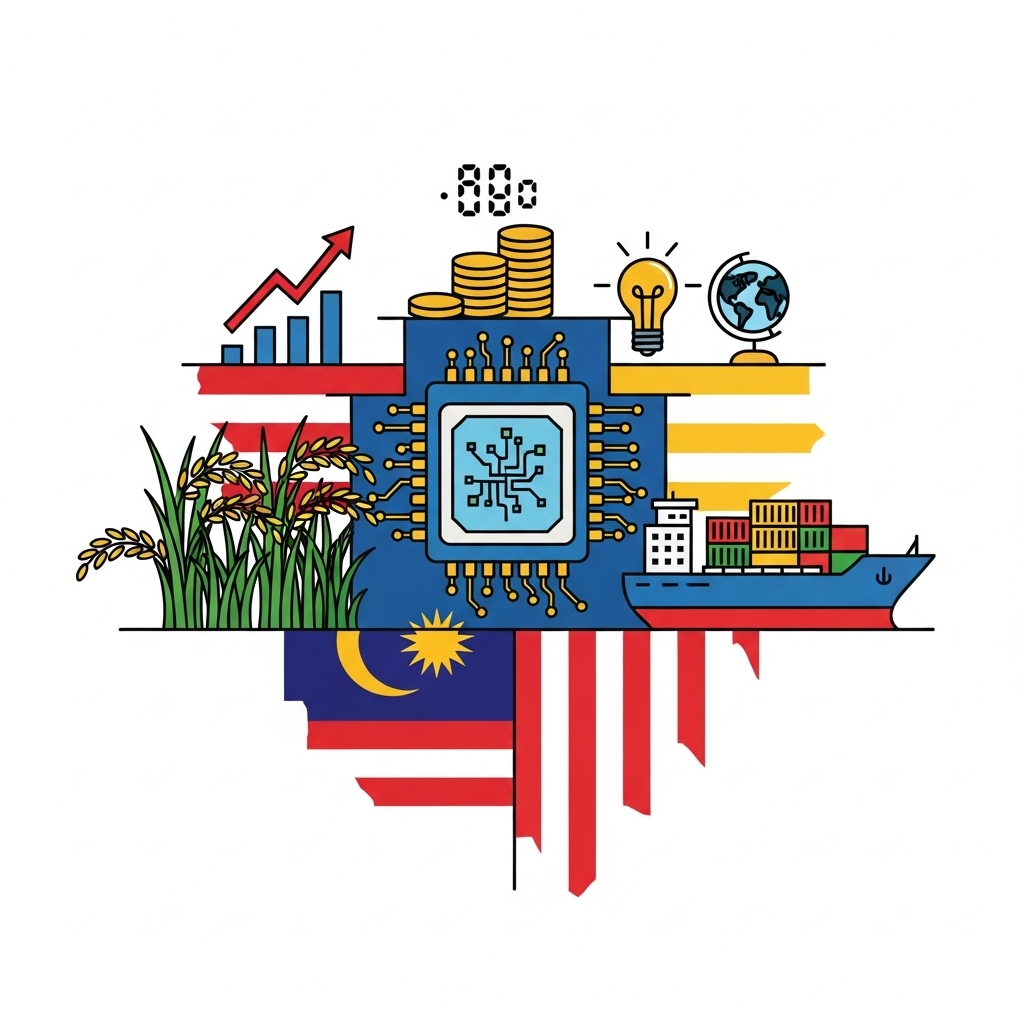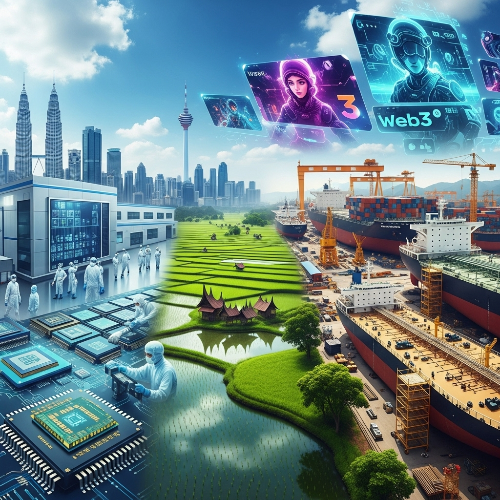Economic Initiatives and Investments in Malaysia: Key Highlights
Economic Initiatives and Investments in Malaysia are accelerating as the country pursues ambitious goals across multiple sectors. Guided by the 13th Malaysia Plan (RMK-13), these initiatives aim to boost growth, global competitiveness, and sustainable development. From semiconductors to digital innovation, Malaysia is strategically positioning itself to capture emerging opportunities in the global economy.
The five major initiatives outlined below provide insight into the sectors driving Malaysia’s economic transformation. Each initiative combines government policy, private sector involvement, and international collaboration to ensure measurable outcomes over the next decade.
1. Semiconductor Industry: RM1 Trillion Export Target by 2030
Malaysia is already a global semiconductor player, ranked as the sixth-largest exporter worldwide. Under RMK-13, the country is aiming for an ambitious RM1 trillion in semiconductor exports by 2030. This plan includes expanding production capacity, attracting foreign direct investment, and strengthening local talent through specialized training programs.
- Current Standing: Sixth-largest semiconductor exporter globally
- Target: RM1 trillion in exports by 2030
- Strategies: Build high-tech manufacturing facilities, encourage R&D, and foster partnerships with global tech companies
- Economic Impact: Increased exports, higher GDP contribution, and job creation in high-skill sectors
- Challenges: Global supply chain competition, technological advancement, and skilled workforce availability
For example, states like Penang and Selangor are seeing the development of semiconductor clusters, including wafer fabrication and advanced testing facilities. These hubs aim to attract multinational companies and local startups, ensuring a sustainable ecosystem for semiconductor growth.
2. Agricultural Expansion: Achieving Rice Self-Sufficiency
The government is prioritizing agricultural development to reduce dependence on imports and ensure food security. Expansion is focused on states like Kelantan, Pahang, Terengganu, Sabah, and Sarawak, while key rice-producing areas such as Kedah, Perlis, Penang, and Sarawak are implementing a five-crop cycle every two years.
- Focus Areas: Kelantan, Pahang, Terengganu, Sabah, Sarawak
- Rice Production Plan: Five-crop cycle every two years in key rice-producing states
- Impact: Strengthened food security, reduced imports, and increased rural employment
- Technological Integration: Use of precision farming, drone monitoring, and climate-resilient crop varieties
- Future Outlook: Sustainable farming practices and increased exports of high-quality rice
By combining modern technology with traditional farming knowledge, Malaysia is aiming for a more resilient agricultural sector that can withstand climate change and global market fluctuations.
3. Maritime Industry: Becoming a Regional Hub
Malaysia is investing in shipbuilding and maritime infrastructure across Perak, Kelantan, Terengganu, Sabah, and Sarawak. The goal is to establish Malaysia as a leading maritime hub in Southeast Asia, supporting both domestic shipping and international trade.
- Key Shipbuilding States: Perak, Kelantan, Terengganu, Sabah, Sarawak
- Strategic Goals: Expand shipyard capacity, adopt modern shipbuilding technologies
- Economic Benefits: Job creation, foreign investment, and improved logistics networks
- Global Positioning: Enhance Malaysia’s presence in regional shipping routes
- Challenges: Competition from neighboring countries, skilled labor shortage, and infrastructure costs
Investments also include port expansions and logistic innovations that improve supply chain efficiency, making Malaysia an attractive hub for maritime commerce and regional trade.
4. Digital Economy: RM163.6 Billion Investment in 2024
Malaysia’s digital sector saw record investments of RM163.6 billion in 2024, reflecting strong government and private sector collaboration. Focus areas include cloud computing, AI, fintech, and infrastructure development. Strategic partnerships, like those between MDEC and EMERGE Group, aim to strengthen Malaysia’s position as a digital economy leader in Southeast Asia.
- Investment Value: RM163.6 billion in 2024
- Focus Areas: Cloud computing, fintech, AI, digital infrastructure
- Strategic Partnerships: MDEC and EMERGE Group for digital innovation and Web3 gaming
- Economic Impact: Job creation in tech sectors, enhanced international investment
- Future Outlook: Digital services contributing increasingly to GDP and exports
These digital investments also support startups and SMEs, encouraging innovation, entrepreneurship, and adoption of emerging technologies across industries.
5. Web3 Gaming & Innovation: Southeast Asia Hub
Building on digital economy investments, Malaysia is actively developing a Web3 gaming hub. Partnerships with MDEC and EMERGE Group are creating opportunities for blockchain-based gaming, e-sports, and interactive media. This initiative is designed to attract talent, international investment, and technological expertise.
- Key Players: MDEC, EMERGE Group
- Goal: Position Malaysia as Southeast Asia’s Web3 gaming hub
- Economic Impact: Innovation ecosystem, job creation, global recognition
- Technological Focus: Blockchain, NFT gaming, metaverse experiences
- Future Potential: Increased digital exports and regional leadership in Web3
Broader Economic Impact
These five initiatives collectively strengthen Malaysia’s economy by diversifying sectors, creating high-value jobs, and boosting global competitiveness. Strategic investments in manufacturing, agriculture, maritime, digital economy, and Web3 innovation demonstrate a forward-looking economic strategy that supports sustainable growth.
Challenges to Address
Despite ambitious goals, challenges remain. These include infrastructure development, talent upskilling, environmental sustainability, and global competition. Addressing these is critical to ensure that Malaysia’s economic initiatives yield long-term benefits.
Conclusion
Economic Initiatives and Investments in Malaysia highlight a comprehensive growth strategy spanning semiconductors, agriculture, maritime development, digital innovation, and Web3 gaming. Successfully implementing these plans will enhance Malaysia’s economic resilience, global positioning, and quality of life, supporting its vision of becoming a leading regional economy in Southeast Asia.



